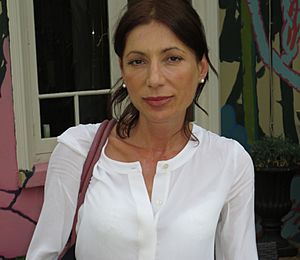Laura Mersini-Houghton facts for kids
Quick facts for kids
Laura Mersini-Houghton
|
|
|---|---|

Mersini-Houghton in 2016
|
|
| Born | |
| Nationality | Albanian, American |
| Alma mater | Tirana University University of Maryland University of Wisconsin–Milwaukee |
| Known for | Multiverse, Origin of the Universe theory, Hawking radiation theory |
| Spouse(s) | Jeff Houghton |
| Children | 1 |
| Scientific career | |
| Fields | cosmology and theoretical physics |
| Institutions | University of North Carolina at Chapel Hill |
| Doctoral advisor | Leonard Parker |
Laura Mersini-Houghton is a brilliant scientist from Albania and America. She is a cosmologist, which means she studies the universe and how it began. She is also a theoretical physicist, someone who uses math and ideas to understand how the universe works. Dr. Mersini-Houghton is a professor at the University of North Carolina at Chapel Hill.
She believes in the multiverse idea, which suggests our universe is just one of many. She has a special theory about how our universe started. Her theory says that our universe was chosen from many others because of how matter and energy behave. Scientists have even tested her ideas with real data from space, and they seem to be correct! She thinks that strange patterns we see in our universe might be caused by the pull of gravity from other universes.
Contents
About Laura Mersini-Houghton
Laura Mersini was born in Tirana, the capital city of Albania. Her father, Nexhat Mersini, was a famous mathematician and economist.
Her Education and Early Career
Laura Mersini-Houghton studied at the University of Tirana in Albania. She earned her first degree there.
Later, in 1994, she received a special scholarship called a Fulbright scholarship. This allowed her to study at the University of Maryland in the United States for eight months. She then earned her Master's degree from the University of Maryland in 1997.
In 2000, she completed her Ph.D. at the University of Wisconsin–Milwaukee. After getting her doctorate, she continued her research. She worked as a postdoctoral fellow, which is a research position after a Ph.D., in Italy and at Syracuse University in the United States.
Becoming a Professor and Developing New Theories
In 2004, Dr. Mersini-Houghton became an assistant professor at the University of North Carolina. She teaches theoretical physics and cosmology there.
Between 2004 and 2006, she published several important papers. In these papers, she shared her theory that our universe came from a multiverse. She also made predictions about what we should find if her theory was true. One of her predictions was the existence of the Giant Void, a huge empty space in the universe.
Her work was recognized, and she became a tenured professor in 2008. This means she earned a permanent teaching position. She was promoted to associate professor in 2009 and later became a full professor.
Sharing Her Ideas with the World
In 2010, Dr. Mersini-Houghton appeared on a BBC television show called What Happened Before the Big Bang. On the show, she explained her theory that the universe is like a "wave function" within a multiverse. Her ideas have also been discussed in books about other famous physicists.
Her predictions about the universe were successfully tested by the Planck satellite experiment. This experiment gathered data from space, which supported her theories.
In 2014, Dr. Mersini-Houghton presented a new idea about black holes. She used math to show that if certain things are true about "black hole firewalls," then the way we currently think black holes form might be wrong. She suggested that Hawking radiation (energy that black holes are thought to give off) might cause a star to lose so much mass that it can't become a black hole. She even helped organize a big conference in 2015 with Stephen Hawking to talk about these important ideas.
Teaching and Inspiring Students
Dr. Mersini-Houghton teaches classes at the University of North Carolina at Chapel Hill. She teaches both undergraduate (college students) and graduate students about Quantum Mechanics. This is a very important part of physics that studies the smallest particles in the universe.
See also
 In Spanish: Laura Mersini-Houghton para niños
In Spanish: Laura Mersini-Houghton para niños
 | Aaron Henry |
 | T. R. M. Howard |
 | Jesse Jackson |

